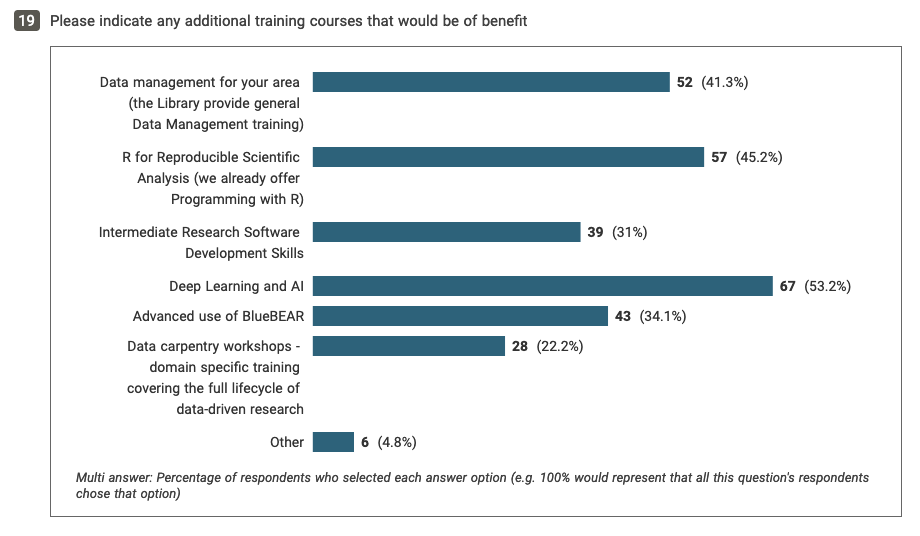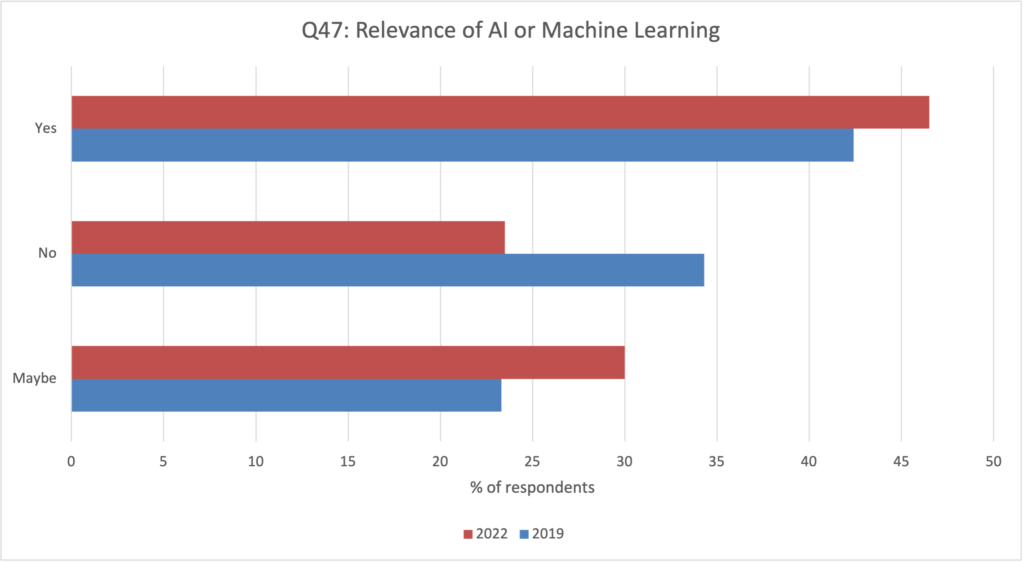Written by Carol Sandys (Head of Advanced Research Computing) & Stephanie Thompson
Thank you to everyone who took time to respond to the Pro-Vice Chancellor for Research’s (PVC-R’s) ‘IT Needs of Active Research’ Survey (pdf of questions available below), open between 23 May to 1 July 2022. Whilst the response rate was lower than in previous generations of this survey (with 173 responses) and lower than we’d like, we did identify some common areas to address, though few with significant weight.
We were pleased to see satisfaction levels with BEAR at high levels (averaging 4.19 out of 5 from 129 responses) and to hear several comments around researchers receiving good support from BEAR and the Advanced Research Computing (ARC) team.
“This team is amazing. A model for the University which I wish we could replicate – bespoke support, sensitive, thoughtful, and every engagement I have moves my research forward.”
Academic in Theology and Religion
“Put simply, without BEAR I would not be able to do the research that I do. The highly-professional advanced computing facility is absolutely critical to pretty much every[thing] I curren[tly] work on.”
Academic in Geography, Earth and Environmental Sciences
We have already relayed messages to other units responsible for delivering the service to which comments relate and are working through those that rest with IT Services, either with the End User Services Division (EUS) or with ARC.
In many cases, the item is specific to one or two individuals. Wherever possible we are contacting them directly to advise. However, immediately below, you will find information on a set of comments which suggests more widespread relevance. In many cases, solutions already exist or are in the pipeline. We hope this update will resolve issues for some and indicate the progress being made elsewhere.
Turnaround on Support Tickets
There have been times when the volume of Service Desk tickets has exceeded ARC’s capacity; particularly after the departure of several people from the team at the end of last year/beginning of 2022. I’m pleased to say that we have recruited to fill all the gaps and have been able to add one post, aimed particularly at building applications and dealing with mainstream, user support issues. We do also get requests which can prove challenging. In these cases we will always aim to let you know what needs to be done to solve them and how long that might take if developments are required. Very occasionally, we may advise that it is not possible for us to solve the problem.
Storage Amounts
There are currently no plans to increase the standard storage allocation above the 3TB limit per project, with fewer than 7% of projects purchasing additional capacity and most of those spending less than £1k. Additional storage on the Research Data Store (RDS) can be purchased at very modest costs and includes enterprise class backup – see our webpage on ‘BEAR Research Data Store costs‘.
Compute Availability
We have a funded, rolling programme of renewal for the compute resource which underpins all BEAR computational services such as BlueBEAR (including the BEAR Portal) and BEAR Cloud. This enables us to introduce the latest technology and evolve the service in-line with demand. In the last couple of years, this has seen an increasing provision of GPU capability, in part added to BEAR itself but also through UoB’s share of Baskerville (the national accelerated compute service, operated by Birmingham).
Additional Training
There is clear demand for courses and capacity to be added to the established BEAR training programme (see https://intranet.birmingham.ac.uk/bear-training). We currently do not have the resources to meet the demand but have been encouraged by the PVC-R’s Digital Research Committee and our Research Computing Management Committee to develop a business case to scale it up. Requirements so far identified include: Deep Learning and AI (we are now providing this NVIDIA course), discipline-specific data management and R for Reproducible Scientific Analysis (see below graph).

Demand for Research Software Engineers
The BEAR Software service is expanding with two new Research Software Engineer (RSE) recruits joining in January 2023. If your project might or does need software engineering expertise, please get in touch (ideally during the planning process) to see what we can contribute to your project and figure out the costs.
Engagement and Advanced Research Computing
ARC works with a management committee, the Research Computing Management Committee (RCMC), with representatives from all five Colleges, as well as with many groups across campus to understand needs both current and emerging. RCMC is chaired by Prof Andrew Morris. We also hold regular sessions across campus and speak in Schools on request. If you would like to discuss your requirements or tell us your ideas, we’d be happy to hear from you.
Raising Awareness about BEAR Services
Twenty-five percent of our survey respondents were non-BEAR users and there were several areas identified where awareness needs to be raised about what is on offer at the University from both BEAR and the wider IT Services. In response to a number of comments on research data management and the aggregated data from specific questions, together with the Library we recently held a ‘Data Horror Stories’ event (slides available via this Canvas course) to raise awareness & knowledge around; 1) the secure data storage available, including backups, 2) sharing data, 3) Data Management Plans and 4) the institutional data repository for open data.
Only 40% of survey respondents reported being aware of the BEAR Portal, which enables more interactive use of BlueBEAR and hence we recently held a well-attended seminar in the Business School, covering all services available from BEAR and a demonstration on how to use the BEAR Portal (demo recording available from the BEAR portal webpage). A similar event is planned for postgraduate researchers in EPS in November and a follow-up bespoke session is being delivered to Economics & Business Studies, focusing on applications of Machine Learning and AI in their area. The Survey identified AI as one specific area of growing importance for researchers (see figure below). These compute needs could be met by our Tier 2-High Performance Compute facility Baskerville.

Comments Relating to End User Services
There are a number of comments that relate to End User Services, the part of IT Services that manages desktop facilities, as well as support for devices and facilities in College. These comments cover topics including the reorganisation of support in College, admin rights on user devices plus the sharing of files externally. Responses to these comments will be covered in a future blog post.
Update – 08/06/23
We are pleased to announce that external sharing of files is now available via Microsoft 365 – please see the blog post on external sharing for more information.
